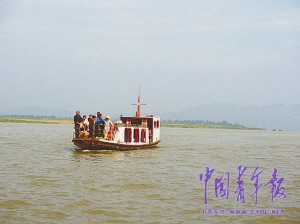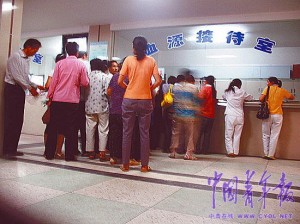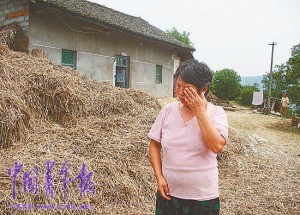In Hubei’s Yunxian County, some come to sell their blood plasma — 600 cc for 168 yuan — to make ends meet. From China Youth Daily [CN], excerpted and translated by CDT:
The white boat with 35 passengers measures about 5 meters long, and is headed for Shiyan metropolitan area’s Yunxian County seat in Hubei province. It embarked from Sunjiawan, 30 kilometers upstream. For 10 years, the boat has sailed down Han River, the longest tributary of the Yangtze, and is called a “liner” by villagers.
But when Zhou Wenfen and her neighbor, surnamed Liu, boarded the boat with others, some were accustomed to calling the boat “blood boat.”
Passengers would ask them: “Are you coming to do that?”
The majority of these passengers were nearby fellow villagers. Although behind their backs, they would directly use the three words “selling blood plasma,” they would all substitute the phrase “do that” when speaking face to face.
Indeed, these two village women had come to “do that.” Their goal was to come to Yunxian’s blood plasma collection (plasmapheresis) station. There, each time they give 600 cc of their blood plasma, they receive 160 yuan for a “nutrition subsidy” and 8 yuan for a “travel subsidy.” Aside from farming, this is practically their only way to make money.
From China Daily:
China implements an uncompensated blood donation system, in which healthy citizens aged 18 to 55 are encouraged to donate blood voluntarily. Relevant government departments or units can subsidize donors, according to the country’s Blood Donation Law that went into effect in 1998.
No more than 600 cc of blood can be collected each time. Donors are not allowed to donate more than once every two weeks, according to the Ministry of Health’s blood plasma collection station administrative measures that took effect last March.
One health expert said that donating blood frequently is safe, if the procedures are followed properly.
“Regular donations would not harm farmers’ health if its operation conforms to the national standards and laws,” Tan Xiaodong, professor with school of public health of Wuhan University, told China Daily yesterday.
“But instead of donating blood, the Yunxian county government and local farmers should take more active measures to change their poverty-stricken life,” he said.











